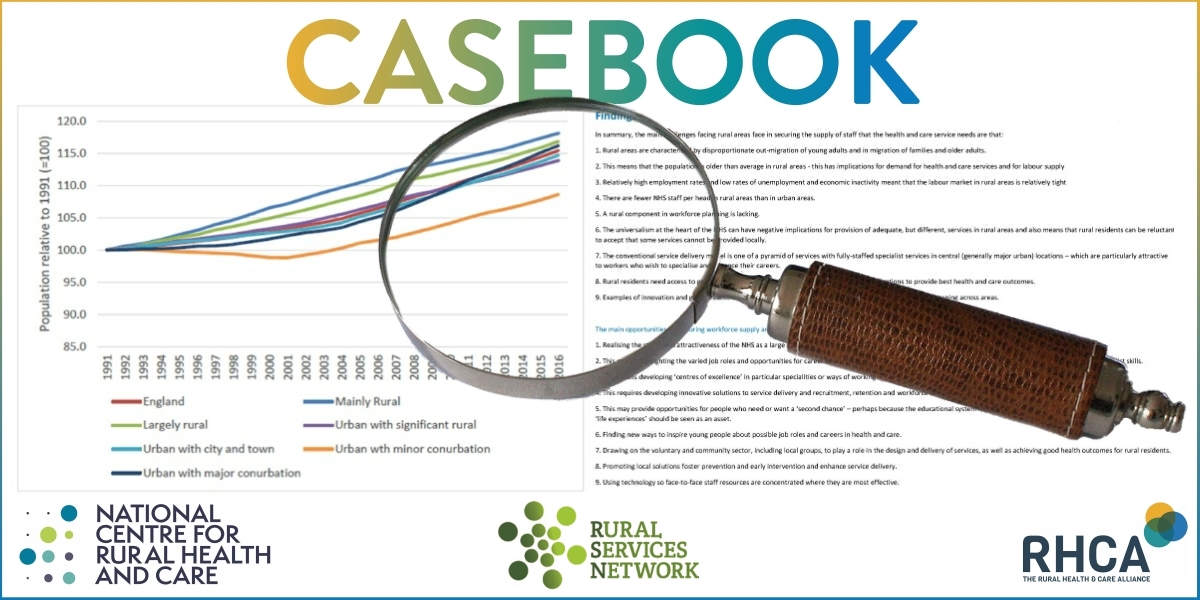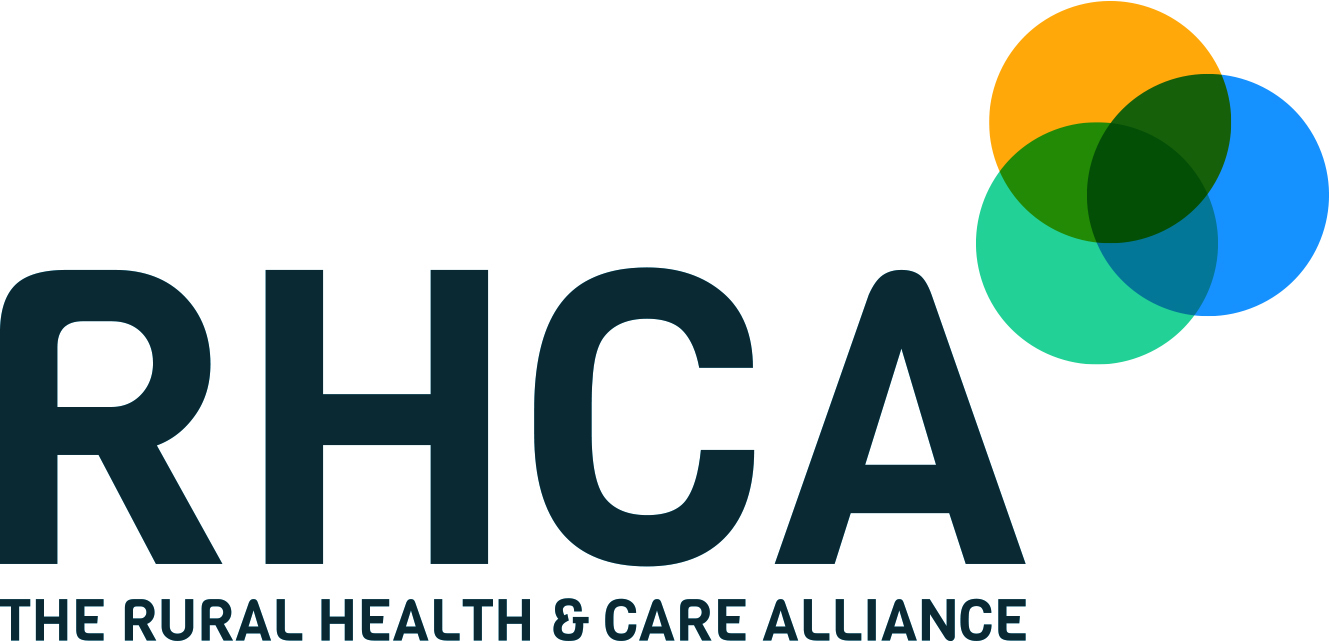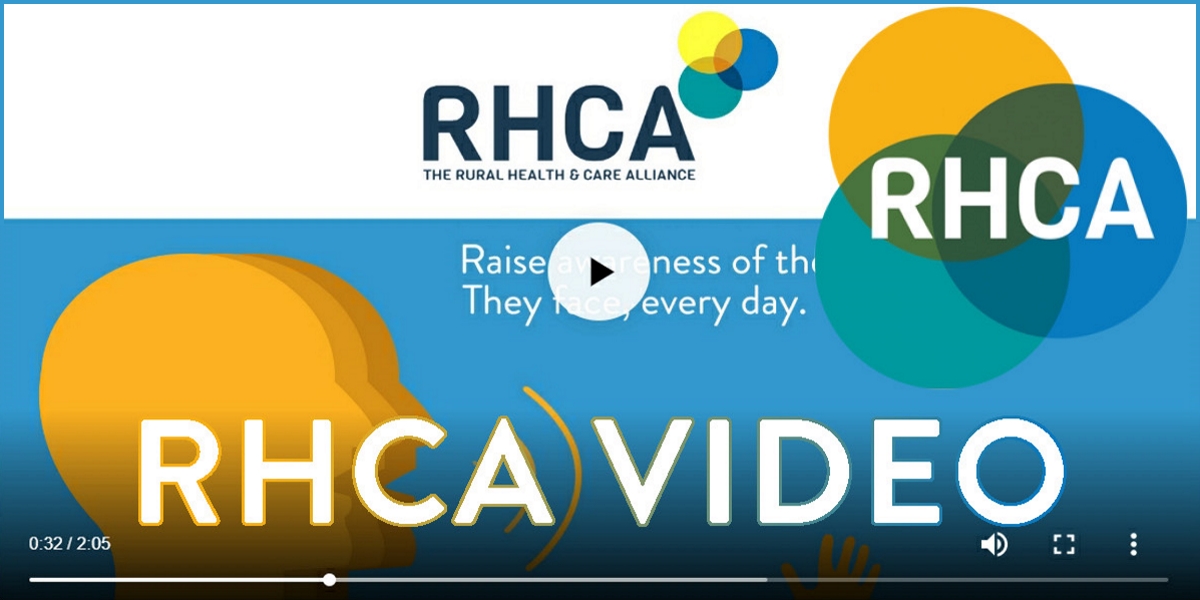T: 01822 851370 E: [email protected]
Visit RSN Survey about life in rural England to find out more.
January Edition of Casebook from the Rural Health and Care Alliance
 January 2025 Edition
January 2025 Edition
In this edition of Casebook we feature a final call for evidence for the Rural Health Workforce Toolkit and share the Nuffield Trust’s thoughts on NHS workforce expansion. We also highlight an NHS project showing the benefits of fishing for improved mental health and share a story focusing on the power of village-based smartphone training and the health benefits it can unlock. And finally, we look at social care reform including views from Age UK. Read on…
 Rural Health Workforce Toolkit – Final Call for Evidence
Rural Health Workforce Toolkit – Final Call for Evidence
The National Centre for Rural Health and Care is renewing their invitation to colleagues across the UK and beyond to contribute to their new Rural Health Workforce Toolkit. We wrote to you in October last year when we launched our Call for Evidence. This will be closing on 14 February 2025 but there is still time to input your views, experiences, and examples of good practice, from anywhere in the world.
In 2020, the NCRHC, in partnership with Rural England, produced a Rural-Proofing for Health Toolkit to support policy makers to identify and meet the unseen health and care needs of their rural and coastal communities. Such communities typically have a resident population with an older age profile and a high prevalence of complex needs, and often a transient seasonal population. Rural health care providers struggle to recruit: health teams are smaller with more limited opportunities for skill development and high dependency on temporary staff. Unsurprisingly, rural health delivery is significantly more expensive per capita than urban provision.
Workforce is the biggest challenge to rural health and care providers, doubly so in rural areas. In response, the NCRHC is revisiting its 2020 toolkit, focusing this time solely on the workforce challenge. This is a global issue and there is innovative regional practice emerging in “grow your own” policies, rural placements for health professionals, and targeted rural training. By collating and sharing this collective experience, the NCRHC aims to produce a timely response to the workforce crisis which will be of practical value to rural health and care practitioners and providers.
Please take a moment to read the Call for Evidence and complete the online survey. There is no need to answer all the questions, only those relevant to yourself. Wherever you work – in the private, public or voluntary sectors, as a provider, practitioner or patient representative – your views will be valued.

Addressing the Challenges of Workforce Expansion in the NHS
The NHS in England is undergoing a significant transformation in its workforce composition, with a dramatic increase in new healthcare roles such as physician associates and nursing associates. However, a new report from the Nuffield Trust warns that lessons from the past about effectively integrating these roles must not be overlooked.
Titled In the Balance, the report highlights the challenges of embedding emerging roles without sufficient planning for regulation, supervision, and communication. It stresses that while expanding the professional mix is crucial for a modern healthcare system, it must be managed with care to avoid disruption and inefficiency.
Key findings from the report include:
- The hospital sector in England has a higher proportion of non-doctor and non-nurse staff compared to other OECD countries.
- Government projections rely heavily on new roles, such as nursing associates, whose numbers are expected to grow significantly.
- Financial incentives have driven recent workforce changes, but these can distort local staffing decisions.
The report calls for NHS England to take immediate action, including reviewing salary reimbursement schemes, clarifying governance for new roles, and commissioning research on staffing impacts. It also urges local NHS employers to refine job descriptions and address concerns about pay and role clarity.
By integrating emerging roles with careful planning and robust support structures, the report states that the NHS can ensure these changes lead to improved care and sustainable workforce growth.
Read the report and key findings in full HERE.
 Fishing Initiative Shows Promising Results for Mental Health Support
Fishing Initiative Shows Promising Results for Mental Health Support
A new initiative highlighted by the BBC that combines fishing with mental health support has demonstrated positive outcomes, according to Essex Partnership University NHS Foundation Trust (EPUT). The programme, developed in collaboration with Investigating Countryside and Angling Research Projects (ICARP), is tailored to assist individuals facing mental health challenges. It aims to offer a unique and accessible form of social prescription.
Funded with £19,200 by the North East Essex Health and Wellbeing Alliance, the programme provides participants and their support workers with coached fishing sessions. Since its inception, about 1,000 individuals have benefited from ICARP’s various services, with a smaller cohort receiving focused one-on-one assistance.
The initiative's core goal is to support mental health early, reducing the risk of deterioration. Participants report improved mood, reduced isolation, and strengthened community connections. Robert Chandler, from EPUT, has highlighted the programme's success in reducing mental health challenges and fostering new social bonds.
The benefits of the programme are evident in the stories of those involved. A participant recovering from a traumatic brain injury described the activity as a chance to relax and forget daily stresses, emphasising the therapeutic value of being in nature. Similarly, a military veteran found solace in the program following a personal loss, calling it a “second family” where he could connect with others and rediscover a sense of belonging.
ICARP’s joint chief executive, Dr. Mark Wheeler, sees fishing as a viable complement to traditional mental health treatments. While not a cure-all, it offers symptom relief, reduces stigma, and provides an alternative to medication or therapy. The programme's regular sessions allow monitoring of participants’ well-being, offering GPs a broader range of tools for supporting mental health.
The initiative also creates opportunities for participants to give back. Veteran Brian Haycock, now a coach for ICARP, finds joy in helping others experience the excitement and tranquillity of angling, describing it as a mutual "buzz" that enhances both the coach’s and the participant’s experience.
ICARP’s impact is under study by the University of Essex, with findings expected by 2028. This research aims to deepen understanding of how fishing can aid those with trauma-related illnesses, paving the way for broader implementation.
 Smartphones Empower Rural Elderly to Access Health and Care Services
Smartphones Empower Rural Elderly to Access Health and Care Services
In the rural village of Gotherington, Gloucestershire, an innovative initiative is helping elderly residents embrace digital technology to improve their access to essential health and care services. RSN Member, Tewkesbury Borough Council is hosting smartphone training sessions to equip older villagers with the skills needed to navigate apps like the NHS app, send emails, use WhatsApp, and recognize scams.
Lauren Woods, who leads the sessions, spoke to the BBC to highlight the unique challenges faced by rural areas like Gotherington, where poor mobile signal can hinder connectivity. To address this, the classes focus on utilising Wi-Fi as an alternative. “Mobile phones are going to be a lifeline for people,” she explained. “We’re teaching skills that help participants access healthcare resources, contact loved ones and stay safe.”
The training includes practical guidance on using the NHS app, vital for managing appointments, prescriptions, and health records. Participants also learn about two-factor authentication, a crucial security feature that often poses challenges in low-signal areas.
The programme has already made a difference for residents like 93-year-old Vera Goodhind, who admitted to initially struggling with her smartphone. “I wanted to use emails and WhatsApp, but I found it difficult. You’re never too old to learn,” she shared. Fellow participant Jane Stevens, who has lived in Gotherington for 35 years, echoed these sentiments. “When you're over 80, learning new skills can be a lot, but it's worth it,” she said.
The council has enlisted ten volunteers to bring this vital training to more communities across Gloucestershire. Ms. Woods, though keen to expand the program, humorously observed, “Ideally, I’d like three of me.”
This initiative highlights the critical role of digital literacy in bridging healthcare gaps in rural areas. By empowering elderly residents with smartphone skills, the programme ensures they can access vital health services, stay connected, and maintain independence, even in areas with limited infrastructure. It is a testament to how small, localised efforts can make a big impact on rural health and care accessibility.
 Age UK Welcomes Social Care Commission Announcement with Cautious Optimism
Age UK Welcomes Social Care Commission Announcement with Cautious Optimism
Age UK has welcomed the recent announcement by the Department of Health and Social Care (DHSC) to establish an independent commission for social care reform, describing it as a potentially transformative step forward. However, the charity also voiced concerns about delays in addressing critical funding issues for older adults.
Caroline Abrahams, Charity Director at Age UK, emphasised that while the appointment of Baroness Casey to lead the commission is encouraging, the true test will be whether the Government acts decisively on its recommendations. "The most sensitive issue—how to fund the care needs of our ageing population—remains unresolved until the commission’s second phase, which is deeply concerning," she said.
Age UK highlighted that while the reforms could deliver a long-overdue overhaul of the system, any tangible benefits may not materialise until the 2030s. In the meantime, older people and their families will continue to face the challenges of a struggling system. Immediate action and significant investment in this year’s Spending Review are essential to stabilise services and strengthen the workforce as foundational steps toward broader reform.
The full statement and further details can be accessed HERE.
 Navigating Challenges in Adult Social Care: Insights from the Sector Pulse Check 2024
Navigating Challenges in Adult Social Care: Insights from the Sector Pulse Check 2024
The recently published Sector Pulse Check 2024, a collaboration between Hft and Care England, sheds light on the financial and workforce struggles facing the adult social care sector. Based on data from over 200 care providers, the report paints a concerning picture of a sector grappling with underfunding, staff shortages, and escalating costs.
Among the key findings, over 90% of care providers identified workforce-related expenses as their top financial pressure, driven largely by rising wages and recruitment challenges. The vacancy rate in adult social care remains significantly higher than in other sectors, emphasising the urgent need for sustainable workforce strategies. Additionally, the report states that delayed payments from local authorities and escalating energy costs compound the financial strain, leaving many providers in a precarious position.
The report makes a compelling case for immediate government action, calling for multi-year funding settlements and parity in pay and conditions with the NHS. These measures are essential not only for stabilising the sector but also for ensuring quality care for vulnerable individuals, in both urban and rural areas.
The full report and its executive summary are accessible via Hft’s dedicated webpage.
Government Announces New Measures and Independent Commission for Social Care Reform
 The Department of Health and Social Care, detailed a series of new measures aimed at reforming adult social care. These measures include immediate financial investments, and the establishment of an independent commission tasked with guiding long-term reforms.
The Department of Health and Social Care, detailed a series of new measures aimed at reforming adult social care. These measures include immediate financial investments, and the establishment of an independent commission tasked with guiding long-term reforms.
 The government has allocated an additional £86 million to this year's Disabled Facilities Grant, increasing the total annual funding to £711 million. This investment is intended to support home adaptations for about 7,800 disabled and elderly people, facilitating more independent living and potentially reducing the need for hospital care.
The government has allocated an additional £86 million to this year's Disabled Facilities Grant, increasing the total annual funding to £711 million. This investment is intended to support home adaptations for about 7,800 disabled and elderly people, facilitating more independent living and potentially reducing the need for hospital care.
The initiative also focuses on integrating advanced technology into care services to help older adults remain at home longer. Efforts to streamline operations and maximise the effectiveness of joint NHS and social care funding are also outlined.
 Additionally, the plan addresses career development for care workers, including enhanced training opportunities that enable them to perform routine health checks at home. These measures are designed to improve job satisfaction and retention among care workers, while also aiming to enhance care quality for recipients.
Additionally, the plan addresses career development for care workers, including enhanced training opportunities that enable them to perform routine health checks at home. These measures are designed to improve job satisfaction and retention among care workers, while also aiming to enhance care quality for recipients.
Baroness Louise Casey has been appointed to chair a new independent commission, known as the Casey Commission, which will examine the current state of adult social care and propose future reforms. This commission is expected to work with a broad range of stakeholders to identify effective improvements to the care system.
The commission will collect insights from service users, their families, care providers, and others involved in social care. Its mandate includes developing recommendations that address both immediate and future needs within the adult social care sector.
The government has outlined a phased approach for the commission’s work. The initial phase will focus on identifying key challenges and opportunities for short-term improvements, set to conclude in 2026. The second phase, expected to finish by 2028, will aim to offer a longer-term vision and structural reforms needed to support an aging population.
These announcements represent a planned approach by the government to address current challenges in the adult social care system and to lay the groundwork for future improvements. The measures include financial investments, technological integration, workforce support, and the establishment of a commission to explore deep-seated reforms.
We’d love to hear from you - share what you’re proud of
If you have something, you would like us to feature in a future edition, please let us know by clicking here to send us an email.
Spread the word
If you know of other organisations that you think would benefit from joining the Rural Health & Care Alliance, please click here to email us and let us know.
RURAL SERVICES NETWORK
Up to date news on Health and Care
The Rural Services Network provides a useful source of themed news content and data. Check out the latest news on Health & Wellbeing and Vulnerability, where you’ll find articles on a diverse range of rural issues affecting rural communities. You might also find this research on Over 65 Population Projections useful too.
Latest from RSN Member Insights
RSN Member Insights is the place to discover the statistics that define communities within our membership. It is regularly updated with new analyses, and these will be highlighted in the 'What's New' section of the RSN's Weekly Rural Bulletin. The Rural Bulletin also provides a selection of the most rurally topical news items, so do subscribe and encourage your colleagues to subscribe to what is an invaluable weekly periodical.
| The Rural Health & Care Alliance is a membership organisation administered by the Rural Services Network on behalf of the National Centre for Rural Health & Care. Explore the RHCA service below: |
 |
 |
 |
 |
 |
 |
 |
 |
 |
 |



